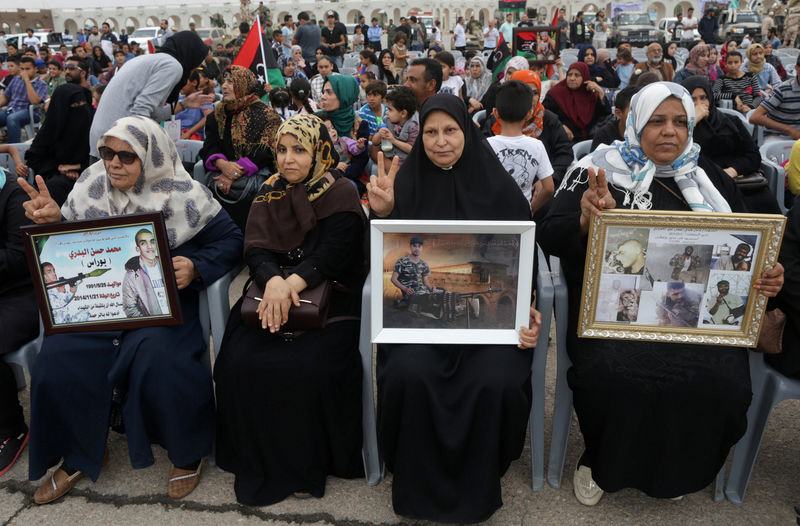By Ayman al-Warfalli
BENGHAZI, Libya (Reuters) - Libyan commander Khalifa Haftar staged a large military parade on Tuesday for the third anniversary of his campaign to control Benghazi, as his troops fight to secure two last districts in Libya's second city.
Haftar's self-styled Libyan National Army (LNA) has become the dominant force in eastern Libya over the past three years, though it continues to face armed resistance in Benghazi and other regions, and to take heavy losses.
The LNA is aligned with a government and parliament based in eastern Libya that rejects a U.N.-backed government in Tripoli.
That has frustrated Western efforts to end a conflict between two loose and shifting alliances that escalated in 2014, worsening the divisions and instability that surfaced with the 2011 uprising against the late strongman Muammar Gaddafi.
Haftar, a divisive one-time Gaddafi ally, launched "Operation Dignity" against Islamist militants who had carried out a wave of bombings and assassinations in Benghazi, though he has also fought former rebels opposed to military rule.
He has received backing from foreign powers including Egypt and the United Arab Emirates.
On Tuesday, thousands of LNA troops paraded in Tocra, 40 miles (65 km) northeast of Benghazi, in front of Haftar, other LNA commanders and senior politicians from the eastern government and parliament. Tanks, Grad rocket launchers, helicopters and fighter jets were also displayed.
The event, billed as the largest of its kind since 2011, was reminiscent of military parades under Gaddafi. It was broadcast in full on pro-Haftar TV.
"WE WILL NEVER KNEEL"
In a speech delivered as parachutists with Libyan flags attached to their feet descended in front of him, Haftar presented the LNA as fighting against the odds to prevail.
"They imposed an arms embargo on us and supported terrorists and cut off men's heads and fired rockets and blocked oil exports - all of this to make us kneel. But we will never kneel except before God," he said.
Haftar and his allies say the U.N.-backed Government of National Accord (GNA) of being beholden to militias, including some with Islamist allegiances. In his speech he repeated pledges to help stabilise the capital, saying the army was for all Libyans.
"We will not leave Tripoli as a hotbed of terrorists and the country will not rest until Tripoli returns to the homeland," he said. Haftar's rivals fear he will try to take military control of the capital, though most doubt he has the capacity to do so.
Haftar has recently appeared more open to dialogue, meeting the GNA's head in Abu Dhabi. But subsequent comments by the foreign minister in Tripoli suggesting acceptance of Haftar as head of the army sparked an angry reaction amongst factions in western Libya.
The LNA took over key oil ports in September but briefly lost control of them earlier this year.

It is still fighting in the Benghazi neighbourhoods of Souq al-Hout and Sabri, where a military spokesman said one of his men was killed and one wounded by a landmine explosion on Tuesday. At least 15 LNA troops were killed and 60 wounded in a military push there last week.